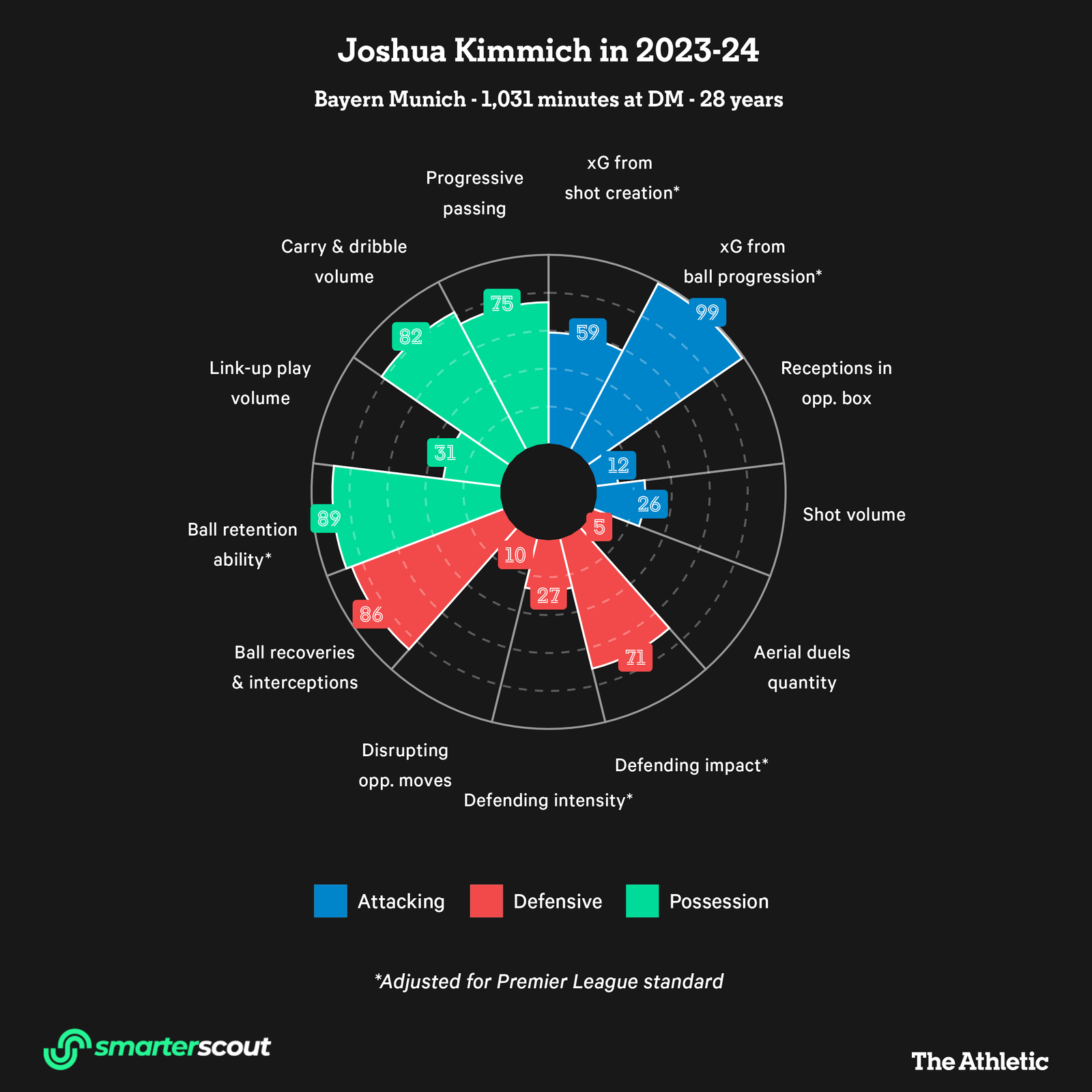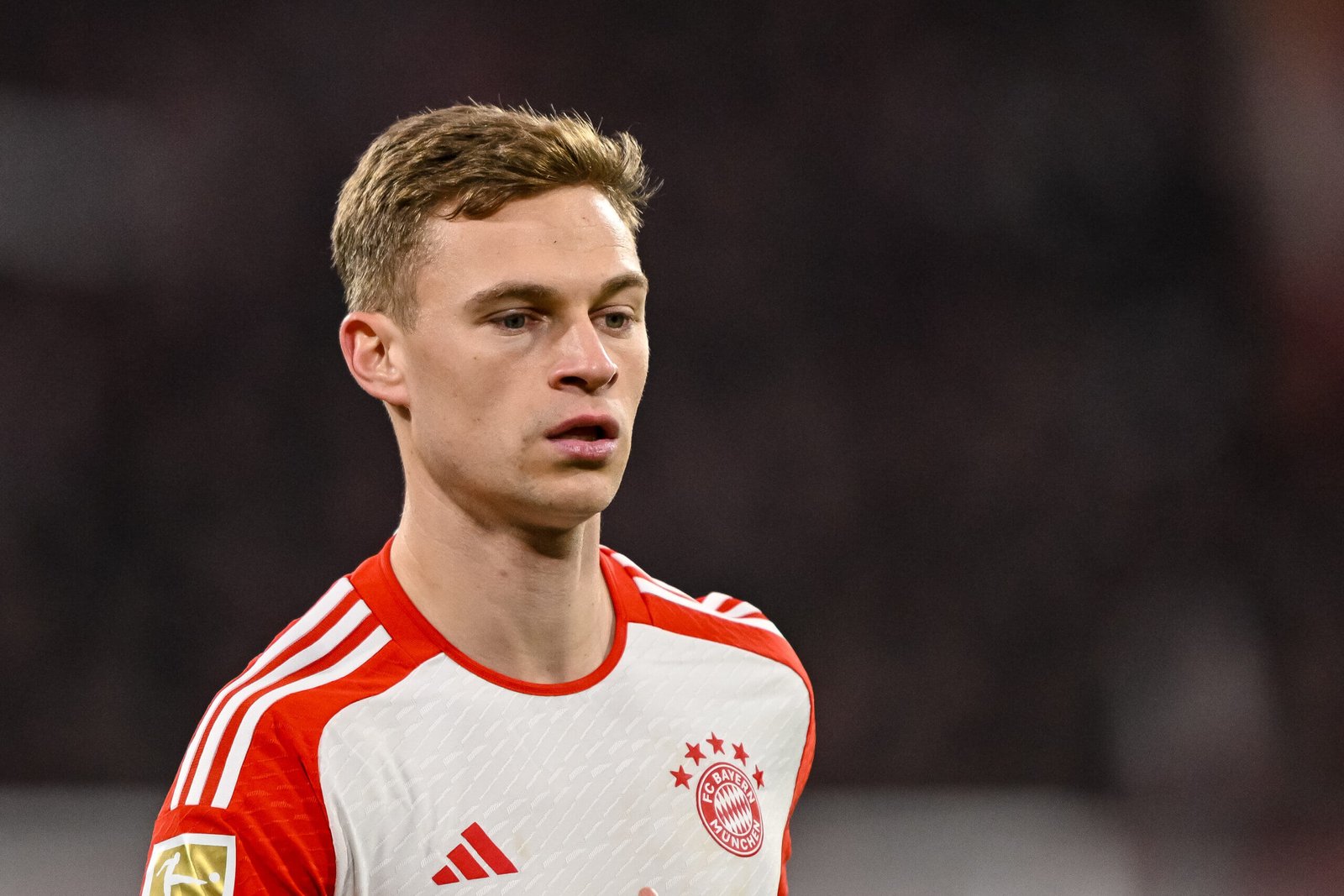Bayern Munich’s regulation 1-0 win on Wednesday night will be remembered for Union Berlin manager Nenad Bjelica shoving Leroy Sane in the face and getting sent off by the referee. “It’s not acceptable,” Bjelica said of his misdemeanour.
Thomas Tuchel was surely grateful for that touchline brouhaha since it diverted attention from the fact that he, too, had slapped down a player before kick-off — perhaps even more brutally.
Asked why Leon Goretzka was back in the starting XI after two games as a substitute, the Bayern manager said that Raphael Guerreiro’s shift to the left-back position for the out-of-form Alphonso Davies had opened up a spot for the Germany international in midfield. In other words, Tuchel called Goretzka a “Luckenbusser”; a stand-in. Ouch.
It’s hardly a secret in the Bavarian capital that the coach would have been happy to let the 28-year-old go in the summer. He is too much of a runner and not enough of a passer for Tuchel’s taste. Goretzka’s game time (or lack thereof) will be a central media theme in weeks to come, with a European Championship on home soil looming large. But there is a big danger that it will distract from a far more important issue at the heart of this team.
Bayern, if they’re not careful, will lose their most influential figure and designated leader of the post-Manuel Neuer and Thomas Muller-era: Joshua Kimmich.
Kimmich is out of contract in 2025. You would have expected the German champions to move heaven and earth to tie down a player of his quality and personality — “He is the embodiment of world-class,” former CEO Karl-Heinz Rummenigge said in 2021 — beyond that cut-off.
But negotiations on an extension have not even started.
The reshuffle of Bayern’s leadership, including the incoming board member for sport Max Eberl, partially explains the inertia, but this goes quite a bit deeper. Relations between club and player have cooled markedly over the last few months. Now some people within the setup are seriously considering selling a player who was previously untouchable this summer. How did it come to that?
Kimmich and Thomas Muller follow Jamal Musiala off the pitch after Bayern’s loss to Werder Bremen (Marcel Engelbrecht – firo sportphoto/Getty Images)
October 2021 marked a critical juncture.
That month the German tabloid Bild, without Kimmich’s consent, revealed that he was Covid-19 vaccine hesitant. He later contracted the virus, suffered lung damage, took the vaccine and publicly regretted his previous stance. But his anger over the Bild story led to a total breakdown in trust between him and the paper.
Kimmich was no longer available for interviews. Coincidentally, reviews of his performances became progressively negative.
Sport-Bild columnist and Sky Germany pundit Lothar Matthaus turned into the player’s chief critic, accusing him of “getting on his team-mates’ nerves” with his outspoken post-match comments and gestures, of “making all those who play next to him worse” (because they had to cover for his runs forward) and, more recently, of “hiding” (instead of doing outspoken post-match interviews).
“He doesn’t have the same presence, on and off the pitch,” the 1990 World Cup winner said.
Three former Bayern players heaped further opprobrium on him. Mario Basler said Kimmich was “playing crap” and “jogging along in midfield”, “not doing Bayern’s game any good”. Dietmar Hamann spied “a lack of discipline” in Kimmich’s positioning. “Holding midfielders such as Rodri or Fabinho do the work of others, closing spaces and gaps,” he said. “Kimmich hasn’t been able to do that recently on the contrary.”

Kimmich has come in for criticism of late (Harry Langer/DeFodi Images via Getty Images)
After Bayern beat Dortmund 4-0 in November without the suspended midfielder, Hamann wondered whether the team wasn’t better off without him. Markus Babbel, too, felt Kimmich was “all over the place — but not where he needs to be”.
Bayern’s main midfielder coming in for harsh if not polemical criticism is nothing new in Munich. Just ask Bastian Schweinsteiger, Michael Ballack, Thiago or, indeed, Matthaus himself. In the not-so-distant past, bosses would have hit back at the detractors. But Germany’s most vocal club have fallen silent like a monastery. There have been no attempts whatsoever to protect Kimmich. It’s as if open season has been declared on him. Everyone can fire at will without fearing repercussions.
CEO Jan-Christian Dreesen and chairman Herbert Hainer lack the footballing gravitas of their predecessors, Rummenigge and Uli Hoeness, and are thus reluctant to put their heads too much above the parapet. Kimmich’s tendency to voice inconvenient truths has probably also annoyed those above him. After Julian Nagelsmann’s sacking last March, he and Goretzka denied the official narrative of the coach having lost the dressing room.
And when Bayern won the championship on the last day of the season in May in dramatic fashion but immediately announced the dismissals of CEO Oliver Kahn and sporting director Hasan Salihamidzic, Kimmich professed himself “surprised”, adding that the club should have maybe waited “two or three days” before taking such a step.
Tuchel hasn’t helped matters either, by publicly questioning the player’s credentials as a holding midfielder.
“Joshua is our strategist who likes to do everything and can do everything,” Tuchel said on the eve of the new season. “He’s very good in assists and plays many penultimate passes.” But the team, Tuchel added, need “a real defensive midfielder, who thinks very defensively, takes care that nothing happens at the back and who is more concerned with defence than attacking the opposition box”.
Tuchel wanted to buy a specialist for the role to release Kimmich from some of his defensive duties. After the move for Fulham’s Joao Palhinha stalled on the final day of the summer transfer window, however, Tuchel was stuck with a Kimmich-Goretzka double-pivot in which he does not quite believe. His doubts have only further encouraged the naysayers.
Kimmich would agree he has not quite been at his best this season. But a statistical look at his Bundesliga performances — using smarterscout, and adjusted for Premier League standards — shows that the criticism coming his way has been rather overblown.

They don’t differ too much from the 2019-20 season, when Bayern won the treble and everyone agreed he was superb.

Ball recoveries and interceptions are up, suggesting he’s very good closing down passing lanes and picking up loose change.
Disrupting opposition moves through tackling, fouling, blocking and clearing is down by a similar margin. The drop in defensive intensity, meanwhile, is probably more to do with Tuchel’s Bayern playing a much more reactive game out of possession than under Hansi Flick.
A lower defensive impact (forcing turnovers or limiting ball progression) explains Tuchel’s longing for a Palhinha-type, ball-winning machine.

But Kimmich gives you so much more.
He is still world-class at getting the ball into dangerous areas and excellent in keeping the ball under pressure, even if more runs with the ball — his carry volume is markedly up from 2019-20 — might add to the perception that he’s spending a little too much time on the ball.
Positional fidelity hasn’t been a problem either. His touch map for the triumphant 2019-20 campaign is somewhat skewed by occasional stints as a right-back.

But if anything, he’s been holding his central position much more diligently this season than those on the anti-Kimmich bandwagon would have everyone believe.

Kimmich has noticed the club’s failure to stand up for him and is prepared to draw his own conclusions. But a source close to the team, who spoke on condition of anonymity to protect relationships, told The Athletic he will resist any pressure to make his mind up one way or the other this summer.
If Bayern really fail to value his impact, ambition and leadership, there will be no shortage of elite-level clubs who will, especially if he digs his heels in and runs down his contract next year.
Like Toni Kroos, who was not deemed influential (and marketable) enough to warrant a €12million (£10.2m; $13m) annual salary by the hierarchy in 2014, Kimmich is guaranteed to find more recognition abroad, come what may.
Losing him would be a blow of similarly epic proportions.
(Top photo: Harry Langer/DeFodi Images via Getty Images)
Read the full article here


